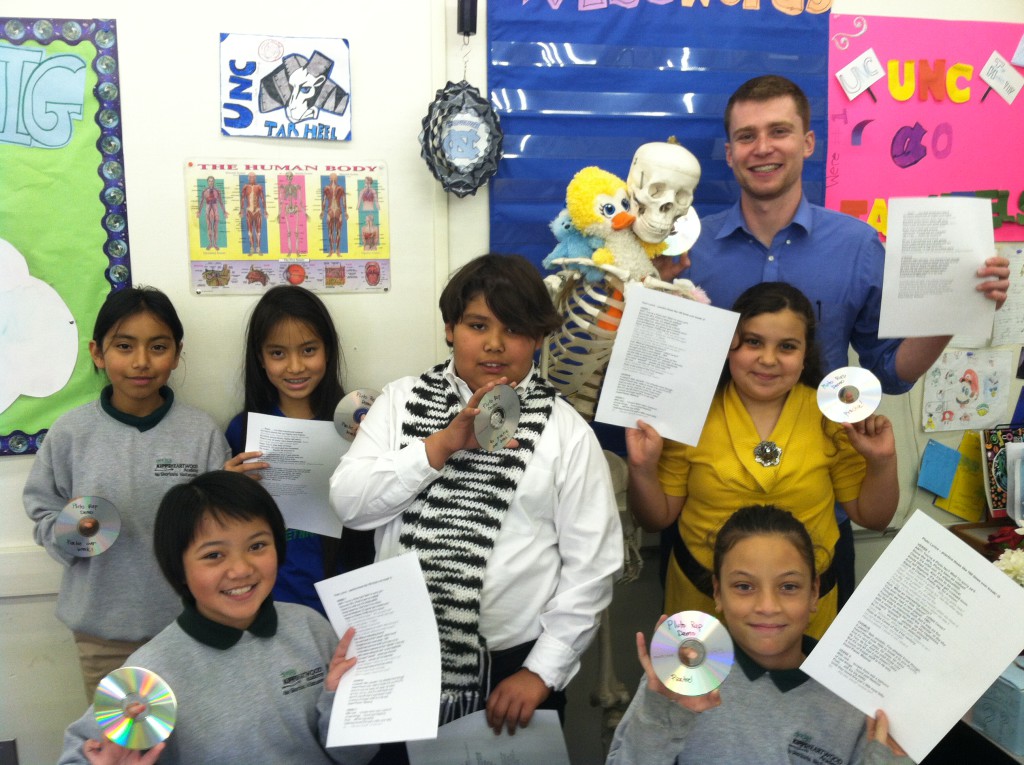
If you heard Tom McFadden rap on the radio, you might never guess he’s Human Biology graduate from Stanford…unless you listen closely to his lyrics. In an ingenious ploy to get people of all ages more excited about science, Tom raps about all things scientific. It all started while he was a senior at Stanford, when he and fellow Stanford student DJ Derrick Davis decided to rap about the role of gene expression in the process over the beat of Jay-Z’s “Money Ain’t A Thang.” The video of the song “Regulatin’ Genes” became a YouTube sensation, and Tom knew he was on to something. In 2011 he won a Fulbright US Graduate Award to New Zealand to pursue graduate coursework in Science Communication. As part of the New Zealand International Science Festival, Tom visited elementary and middle schools in Auckland, Wellington, Christchurch and Dunedin where he helped Kiwi classrooms turn science into rap. Tom has since returned the San Francisco Bay Area and we caught up with him to learn more about his Fulbright experience and fundraising campaign for Brahe’s Battles, his inspirational new project on Kickstarter.
1. What inspired you to apply to a Fulbright fellowship in New Zealand?
I knew I loved biology and I knew that I loved education. However, neither biological research nor classroom teaching seemed like the ideal fit for my interests and skills after I finished my job as a course associate at Stanford. The University of Otago in Dunedin, New Zealand is one of the few places in the world that offers a broad interdisciplinary course in “science communication.” The Fulbright made it possible for me to travel to New Zealand and spend one year in Otago’s graduate program.
I had sacrificed going abroad as an undergraduate to do neuroscience research. So after college I was eager for the opportunity to be thrown into a totally new environment and new culture and to have to see what I was made of. Getting a postgraduate degree in New Zealand was a way to challenge myself, meet new people, and put myself in a situation where I could grow in new ways.
2. How has the Fulbright experience influenced your long-term goals?
Although I enjoyed making science songs as a biology instructor, my Fulbright experience gave me the tools and freedom to take them to the next level. I was able to make a new set of songs that were better produced, with animations better suited to teaching the content. I was able to think critically about science communication, appreciating the value of incorporating compelling historical stories and human narratives that conveyed scientific process. I was able to work with different groups of kids, conducting qualitative and quantitative research that has informed my current approach. Without the time I spent incubating these ideas during my Fulbright experience, I would have probably moved away from the innovative science education work I’m doing toward a more traditional path. Instead, I am now more fired up than ever about the possibilities ahead.
3. Tell us about your Kickstarter campaign – what do you hope to achieve and how can others support you?
I am helping middle schoolers in urban schools create their own science music videos. Though instead of just rapping about the structure of DNA, James Watson and Rosalind Franklin will be arguing about who deserves credit for which aspects of the discovery. The project is aptly titled “Battle Rap Histories of Epic Science (Brahe’s Battles)” I’ll be doing weekly workshops at five Bay Area schools. We go through all the steps that go into conceiving and producing an educational music video.
If these videos get the production budgets they deserve, then they will spread far and wide and will be used by classrooms throughout the world. They will be watched, remixed, remade, reworked – depending on how much time various science classes have to devote to creative endeavors. It will provide an easy and entertaining way for teachers to open up critical discussions about scientific process, evidence-based argument, and the historical contexts of these discoveries.
But most importantly, it’s a really powerful experience for the kids who get to make the videos. There are so many different skills involved that different kids get to show off their different talents. The project is partially funded by an “Social Innovation grant” from Hewlett Packard and Silicon Valley Education Foundation. However, this only covers one video.
So the Kickstarter campaign is a chance for anybody who cares about science, education, or awesomeness to help support a powerful experience for these kids, which will lead to valuable new tools for science education throughout the world. The deadline to pledge your support (and get cool mixtapes and videos and performances in return) is April 16th!
Tom McFadden is a biology educator interested in science-history-music integration. He graduated from Stanford University with a B.A. in Human Biology with a focus in Neuroscience & Behavior. He was born and raised in Sacramento, California where he grew up listening to rappers like Wu-Tang Clan, Outkast, and The Roots. Over the past four years, Tom has traveled to East Palo Alto, Mexico, New Zealand and Japan to help kids create their own science music videos. You can read more at his blog The Rhymebesome.
© Victoria Johnson 2013, all rights reserved.